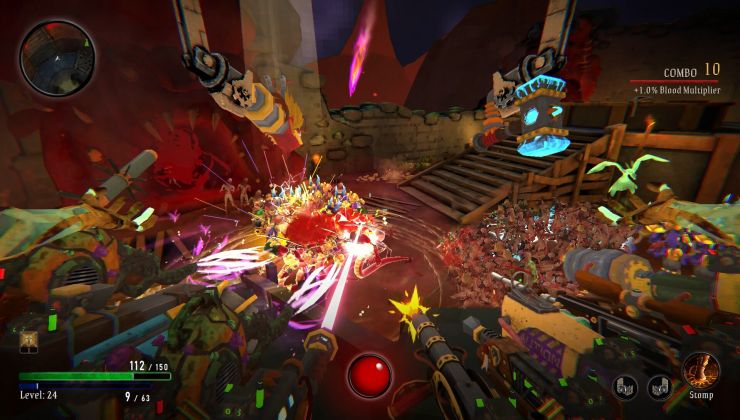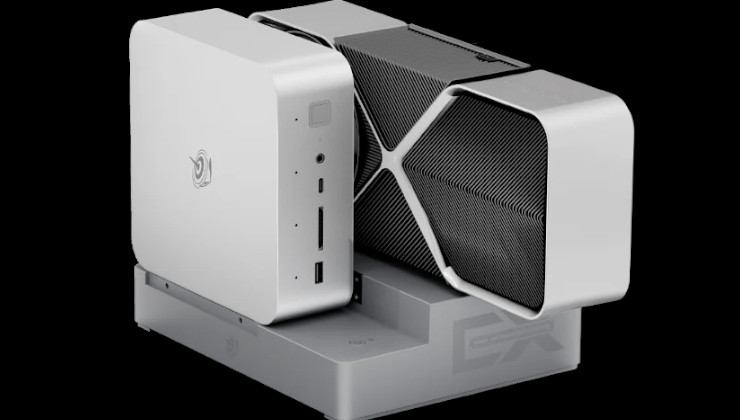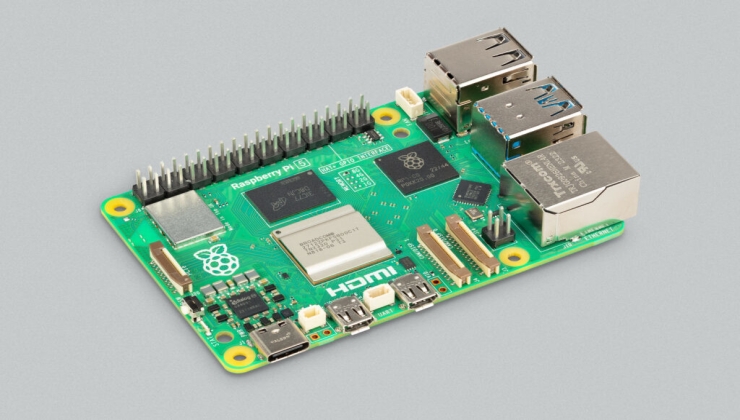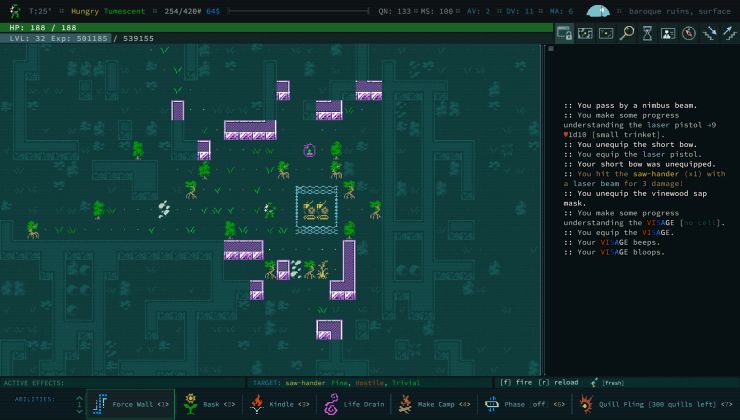It's always interesting to read about what happens inside of Valve. Rich Geldreich, who previously worked at Valve has blogged about his experience inside Valve during Valve's push towards Linux.
It seems Rich was a rather important member of the team and one of the influential people in getting OpenGL + Linux support up to scratch.
He was responsible for speaking to external driver teams and their managers/execs, and he helped present to external game developers about how to get good performance out of OpenGL.
I fondly remember reading the Valve blog post about getting Left 4 Dead 2 running faster on Linux than it did on Windows. I remember feeling so happy about everything that was happening. Rich Geldreich was the one feeding the information to Gabe Newell himself (the owner of Valve) who wrote the blog post.
It seems Valve's plans well and truly scared Microsoft too:
That's very interesting to read about. I had no idea Valve pushing OpenGL and Linux was this serious a threat that Microsoft visited Valve directly.
It sounds like we have a lot to thank Rich for. He even shares what a lot of other people believe, that Linux was/is a safeguard for Valve against Microsoft:
Sadly, it seems when Valve let a bunch of people go back in 2013, the Linux team suffered due to this.
Check out the blog post here.
It seems Rich was a rather important member of the team and one of the influential people in getting OpenGL + Linux support up to scratch.
He was responsible for speaking to external driver teams and their managers/execs, and he helped present to external game developers about how to get good performance out of OpenGL.
I fondly remember reading the Valve blog post about getting Left 4 Dead 2 running faster on Linux than it did on Windows. I remember feeling so happy about everything that was happening. Rich Geldreich was the one feeding the information to Gabe Newell himself (the owner of Valve) who wrote the blog post.
It seems Valve's plans well and truly scared Microsoft too:
Rich GeldreichA few weeks after this post went out, some very senior developers from Microsoft came by for a discrete visit. They loved our post, because it lit a fire underneath Microsoft's executives to get their act together and keep supporting Direct3D development. (Remember, at this point it was years since the last DirectX SDK release. The DirectX team was on life support.) Linux is obviously extremely influential.
That's very interesting to read about. I had no idea Valve pushing OpenGL and Linux was this serious a threat that Microsoft visited Valve directly.
It sounds like we have a lot to thank Rich for. He even shares what a lot of other people believe, that Linux was/is a safeguard for Valve against Microsoft:
Rich GeldreichIt's perhaps hard to believe, but the Steam Linux effort made a significant impact inside of multiple corporations. It was a surprisingly influential project. Valve being deeply involved with Linux also gives the company a "worse case scenario" hedge vs. Microsoft. It's like a club held over MS's heads. They just need to keep spending the resources to keep their in-house Linux expertise in a healthy state.
Sadly, it seems when Valve let a bunch of people go back in 2013, the Linux team suffered due to this.
Check out the blog post here.
Some you may have missed, popular articles from the last month:
I am not quite sure what a "legacy publisher" is. If you are referring to the companies currently releasing pretty much 100% of all AAA titles, then...yeah. That's the ones we want to release Linux games right now, no? Except you're happy getting more 8bit retro games looking like the stuff they released back in the mid 80s. Nothing wrong with (some of) them, mind you, but we have 2,500 of these already. What we need to grow as a gaming platform are games appealing to the mass market. "Oh look, Linux can do outdated graphics like we had 30 years ago!!!" isn't going to cut it.
As for these "legacy publishers", they will not change their internal processes for us 1% any time soon. They are used to making Windows games and that's what they will do for the foreseeable future. For the time being we need porting houses to get access to these games, like it or not. It's actually these porting houses that might be able to press middleware developers into providing a Linux port of the stuff that currently doesn't run in it. They ARE what's currently driving Linux game development. We got the major engines already. The battle these days is for the middleware. If you want "legacy publishers" to switch to cross-platform development, we need to become a serious gaming platform FIRST. We're not quite there yet.
As for these "legacy publishers", they will not change their internal processes for us 1% any time soon. They are used to making Windows games and that's what they will do for the foreseeable future. For the time being we need porting houses to get access to these games, like it or not. It's actually these porting houses that might be able to press middleware developers into providing a Linux port of the stuff that currently doesn't run in it. They ARE what's currently driving Linux game development. We got the major engines already. The battle these days is for the middleware. If you want "legacy publishers" to switch to cross-platform development, we need to become a serious gaming platform FIRST. We're not quite there yet.
6 Likes, Who?
Quoting: operaActually one has Linux support indicated.Right! "Spacious Skies" has.
Last edited by Corben on 6 January 2017 at 12:29 am UTC
0 Likes
Quoting: KimyrielleI am not quite sure what a "legacy publisher" is.
By legacy publishers I mean old media style companies, driven by execs who see profit more important than art. They don't make art - they are certain type of middlemen who profit from others making it. Such companies exist in many art fields. Labels in music, "huge media conglomerates" in films, publishing houses in books, and so on. Games have their analog too, i.e. EA and similar. All those I call legacy publishers. I guess it's hard to define it formally. It's kind of a mindset which combines quite a lot of negative traits, such as purposeful distancing from users of their art, strong mass market bend which sacrifices quality, cutting costs more than necessary to increase profits by reducing support terms and so on. I guess you get the idea whom I'm referring to. Such mindset in my experience usually combines with avoidance of Linux and usage of DRM, though there is no explicit correlation between these. It's more of a common occurrence.
Quoting: KimyrielleIf you are referring to the companies currently releasing pretty much 100% of all AAA titles, then...yeah. That's the ones we want to release Linux games right now, no?
Well, not necessarily. AAA is too ambiguous of a term. Some simply mean big budget games by it, and not all big budget games are made by backwards thinking legacy publishers. Some are made by quite innovative and forward thinking ones, who are interested in Linux too. And in my experience, big budget doesn't necessarily guarantee artistic quality, especially if mass market is the target. Personally I'm interested in more good games, and whether they are big or small budget is really secondary for me. I acknowledge though, that perception of art is to a degree subjective, and good can mean different things for different people.
Quoting: KimyrielleIt's actually these porting houses that might be able to press middleware developers into providing a Linux port of the stuff that currently doesn't run in it. They ARE what's currently driving Linux game development.
I'm not sure they are the biggest drive behind Linux gaming progress. I think engine developers are, and their effort is impacting on a deeper level. But any progress is good, and credit should be given to any good contribution.
Last edited by Shmerl on 5 January 2017 at 8:18 am UTC
1 Likes, Who?
The fact that Valve created SteamOS to show Microsoft Steam is not dependent on Windows was obvious from the beginning - and yet many people are surprised each time someone mentions it, one example being the famous Dell interview about Alienware Alpha/Steam Machines.
One thing I like about Steam on Linux, including SteamOS - or I should say "Steam on Debian/Ubuntu" - is the fact I don't have to care about libraries. All Steam games just work. I know it's not the case for other distros, but the experience on Debian is extremely pleasant.
It would be nice to have a robust set of libraries for gaming with some umbrella name and a version, which could be targeted by devs and given in requirements the way that Windows versions are specified. Ubuntu is very close, but it makes life more difficult for users of other distros.
One thing I like about Steam on Linux, including SteamOS - or I should say "Steam on Debian/Ubuntu" - is the fact I don't have to care about libraries. All Steam games just work. I know it's not the case for other distros, but the experience on Debian is extremely pleasant.
It would be nice to have a robust set of libraries for gaming with some umbrella name and a version, which could be targeted by devs and given in requirements the way that Windows versions are specified. Ubuntu is very close, but it makes life more difficult for users of other distros.
4 Likes, Who?
That was an interesting read... It sounds like it's calling for an interview, isn't it? (if you do so, Liam, please also ask about the current status of FLOSS drivers)
Now,it isn't like Valve completely abandoned us. I would be happy with just a "back burner" status quo; if it means we can slowly grow. But Valve seems so be doing some stealthy moves, and is apparently working or planning to work on a VR composition system with integrated reprojection and such, IIRC (I didn't look it up, but my point is that they seem to be working on Linux VR).
@Liam, the smiley picker goes over the header bar on my phone, I don't think that's intended :)
Now,it isn't like Valve completely abandoned us. I would be happy with just a "back burner" status quo; if it means we can slowly grow. But Valve seems so be doing some stealthy moves, and is apparently working or planning to work on a VR composition system with integrated reprojection and such, IIRC (I didn't look it up, but my point is that they seem to be working on Linux VR).
@Liam, the smiley picker goes over the header bar on my phone, I don't think that's intended :)
0 Likes
Quoting: skinnyrafThe fact that Valve created SteamOS to show Microsoft Steam is not dependent on Windows was obvious from the beginning - and yet many people are surprised each time someone mentions it, one example being the famous Dell interview about Alienware Alpha/Steam Machines.
Well, I hoped that Valve would not just do the least that's required to show independence from Windows but really push the new platform even in the mid to long term. And THAT's what I don't see happening. Just as Geldrich's post hints. That is what I feared and what I'm surprised by this blog post because it names it quite directly.
After all, I am not even sure if Steam on Linux is still this threatening club over MS's head.
For that, way more AAA titles must be available with high-quality ports day one.
Don't see that happening in 2017 despite all optimistic people here.
I heard that before.
EDIT: Still, hope YOU guys are right.
EDIT2: I see that I say "ports", when I just mean Linux as a target platform just from the game dev itself.
Actually I don't want "ports".
Last edited by sub on 5 January 2017 at 10:36 am UTC
3 Likes, Who?
When the Steam OS project was announced, I was really hyped about it and that Valve will create a great gaming OS. Sadly, that didn't happen. I cannot argue with the facts, that Valve pushed Linux gaming to new heights and took part in creating Vulkan, but throughout the years, Steam OS itself seemed more and more like a garage-project, with only a handful of people working on it, just to barely sustain it. Looking back, it feels like at the beginning, they didn't even have any idea, how the state of drivers and other components were on Linux. Nowadays, you can easily get a distribution with superior performance and better hardware support, you don't even need a rolling one for that. So although I am thankful for everything else they had done, but feel that the Steam OS project was left in the dust and will slowly be buried, without anyone remembering it.
Last edited by tuxintuxedo on 5 January 2017 at 10:46 am UTC
Last edited by tuxintuxedo on 5 January 2017 at 10:46 am UTC
3 Likes, Who?
For me it was always just about showing Microsoft that there is a way out for Steam. Microsoft wouldn't be able to lock down Windows overnight and Valve showed they could use that time to make Linux a viable gaming platform. Microsoft backed down, Valve put SteamOS on the back burner.
1 Likes, Who?
Quoting: ShmerlAAA is too ambiguous of a term. Some simply mean big budget games by it, and not all big budget games are made by backwards thinking legacy publishers. Some are made by quite innovative and forward thinking ones, who are interested in Linux too. And in my experience, big budget doesn't necessarily guarantee artistic quality, especially if mass market is the target. Personally I'm interested in more good games, and whether they are big or small budget is really secondary for me. I acknowledge though, that perception of art is to a degree subjective, and good can mean different things for different people.The hipster is strong in this one. :)
Seriously, I love a good indie title, but if you play a game like Mad Max or Tomb Raider, you'll see where all those millions went. There's just tons and tons of highly polished content, from graphics and animation to audio design, made by large teams of professional artists. The mass market focus and the sometimes glaringly Hollywood-style writing-by-committee (sorry, Ms. Pratchett) does not stop them from being astoundingly beautiful and simply hours and hours of great fun.
Of course this is all subjective but assuming a game must be "less good" if it's "mainstream" is just silly. Or at least the assumption part of it is silly. Nothing wrong with informed opinion of course.
6 Likes, Who?
What if Valve realized that exposing their success with L4D better performance under Linux just helped MS to realize they need to reinvest in directX and in effect did not help Valve? What if Gabe did not like it that much and thought they should be less open about the progress? They surely realize OpenGL limitations and so went into Mantle->Vulkan efforts inviting a lot of players into the project. I assume similar happened to engines producers. Valve realized whole infrastructure needs to be ready first to go 100% competition with M$. Since we clearly see improvements with drivers, engines, work with VR etc., I just think Valve is just quietly improving SteamOS into preparing to hit big. Look at how Nintendo, Sony or MS are working on new platforms. They are quiet until they are sure they can hit hard. This is valid and verified strategy.
5 Likes, Who?










See more from me